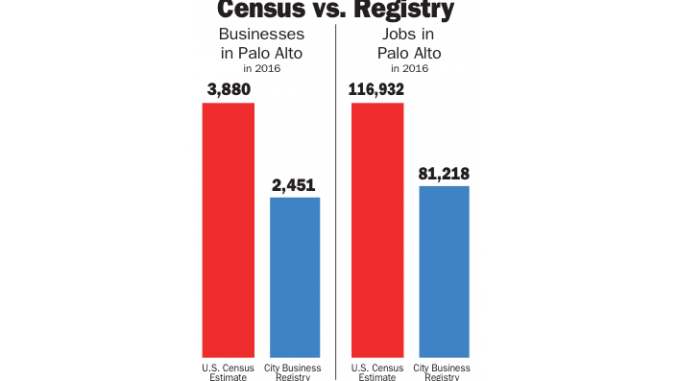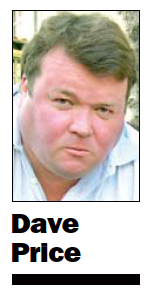
OPINION
BY DAVE PRICE
Daily Post Editor
The city of Palo Alto’s Business Registry is a failure and should be scrapped.
The registry is the program that requires every business in the city to pay a $54 fee and provide information such as the number of workers they employ, how many parking spaces they have and how much square footage they occupy.
 City Council created the registry four years ago to gather information to use for planning and transportation projects.
City Council created the registry four years ago to gather information to use for planning and transportation projects.
But in a new report, City Auditor Harriet Richardson found the registry produces inaccurate information.
For instance, the registry claimed that the number of businesses in Palo Alto fell by 24% from 2015 to 2017, and the number of employees in the city dropped by 9%.
Richardson said that U.S. Census data and sales tax receipts show the number of businesses and employees actually increased during that period.
How far off is the registry?
Census data shows that Palo Alto had 3,880 businesses and 116,932 employees in 2016. But the registry said the city had 2,451 businesses and 81,218 employees.
The registry was off by 1,429 businesses and 35,714 employees.
That’s a big margin of error, even for government work.
Moreover, Richardson could not find anyone at City Hall who was using the registry’s data.
An insult
I’m tempted to call the registry a joke, but it’s really an insult to the business owners in Palo Alto who have to take the time each year to enter their company’s data into the city’s website and write a $54 check.
No, $54 isn’t going to break anyone, but it’s just a slap in the face. The city is saying to the businesses, “We’re not going to use your data. We don’t even care if it’s accurate. We’re just going to make you go to the effort of complying with one of our useless ordinances because we have the power to do so.”
Business owners already spend a great deal of time complying with various federal, state and local paperwork requirements. The city shouldn’t be adding to that paperwork burden with a useless program like the registry.
One big problem with the registry is that the data is out of date. If a business opens in April — a month after the deadline for businesses to renew their annual registrations — it usually won’t be entered into the registry for another 11 months. This is a city where businesses open and close, expand and shrink quickly.
Decision time
Richardson’s audit goes to the City Council’s Policy and Services Committee tomorrow (Sept. 11) night. The committee can go in one of two directions. It can double down on this travesty and push city employees to obtain more accurate data in the future. They’ve had four years to make this work without success. Maybe they’ll come up with more laws to knuckle down on companies that provide incomplete or inaccurate data. Good luck with that.
The other choice is to drop the registry. Council should admit that the city isn’t competent at collecting basic data about the city. The city does many other things well, ranging from police, fire and paramedic services to providing entertaining City Council meetings. But gathering basic information isn’t a strength for the city.
City Manager Jim Keene and council members are talking about the possibility of returning to voters in 2020 with a business tax to pay for bridges to separate the Caltrain tracks from the streets at crossings, something called grade separations. The last time the council put a business tax on the ballot was 2009, and it was resoundingly defeated by residents, 58% to 42%. Passage of a business tax isn’t going to be a slam dunk in 2020 either.
Council should drop the registry as a gesture of respect to the community’s businesses, especially the small firms that find themselves overwhelmed in government paperwork. It will take cooperation between businesses and the city to pass the business tax, and dropping this useless and time-wasting Business Registry would be a good first step.
Editor Dave Price’s column appears on Mondays. His email address is [email protected].




The Residentalists, PAN, etc., will never let council drop the Business Registry. They hate capitalism in any form, especially when practiced by small mom-and-pops. The Business License lets the Residentialists feel some measure of control over local businesses–do what we say or we’ll take away your license and you’ll have to close.
Tougher penalties for non compliance will fix this problem. Those who don’t register should be hit with an automatic 10K fine. The city needs to get serious about this!
Or, maybe they could, you know, fix the problems. Like maybe they could get rid of the stupid fee, and increase the penalty for non-compliance.
I don’t know why the city would switch to a data-based decision-making process when the current process of influence peddling and backroom deals has served Palo Alto so well over the years.
If the city’s real intent here is to obtain information on businesses, they could look at utility records and sales tax receipts. It appears Richardson has done that to some degree, along with Census figures, to get the accurate numbers. Every business in town needs to pay for utilities to keep the lights on, so there should be records about that.
I’m one of the business people who have been ignoring the City’s Business Registry. I run a home-based business with a couple of contractors with no impact on my neighborhood at all. I got a notice a couple of years ago telling me I needed to go to the city’s Website and fill out some online forms. I didn’t understand how my business would have had any impact on the parking or land-use decisions the City was making. It just seemed like b.s. busywork. So I skipped it. I guess I’m a scoff-law, but I don’t care. The City is so screwed up that I doubt my participation would have mattered one way or another.
“Moreover, Richardson could not find anyone at City Hall who was using the registry’s data.”
Why is the City collecting this data if it’s not being used? Astounding. End it NOW!